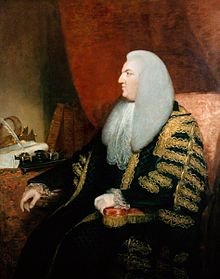Fletcher Norton, 1st Baron Grantley
|
The Right Honourable The Lord Grantley PC |
|
|---|---|

Fletcher Norton, Speaker of House of Commons, 1770.
|
|
| Speaker of the House of Commons | |
|
In office 1770–1780 |
|
| Preceded by | John Cust |
| Succeeded by | Charles Wolfran Cornwall |
| Solicitor General for England and Wales | |
|
In office 1762–1763 |
|
| Preceded by | Charles Yorke |
| Succeeded by | William de Grey |
Fletcher Norton, 1st Baron Grantley PC (23 June 1716 – 1 January 1789) was an English politician.
He was the eldest son of Thomas Norton of Grantley, Yorkshire. Educated at St John's College Cambridge, he became a barrister in 1739, and, after a period of inactivity, built up a profitable practice, becoming a King's Counsel in 1754, and later attorney-general for the county palatine of Lancaster. In 1756 he was elected member of parliament for Appleby; he represented Wigan from 1761 to 1768, and was appointed solicitor-general for England and knighted in 1762. He took part in the proceedings against John Wilkes, and, having become Attorney General for England and Wales in 1763, prosecuted William Byron, 5th Baron Byron for the murder of William Chaworth. However, he lost his office when the Marquess of Rockingham came to power in July 1765.
In 1769, as MP for Guildford, Norton became a privy councillor and chief Justice in Eyre of the forests south of the Trent, and in 1770 was elected Speaker of the House of Commons. In 1777, when presenting the bill for the increase of the civil list to the king, he told George III that "parliament has not only granted to your majesty a large present supply, but also a very great additional revenue; great beyond example; great beyond your majesty's highest expense." This speech aroused general attention and caused some irritation; but the Speaker was supported by Charles James Fox and by the city of London, and received the thanks of the House of Commons.
...
Wikipedia
